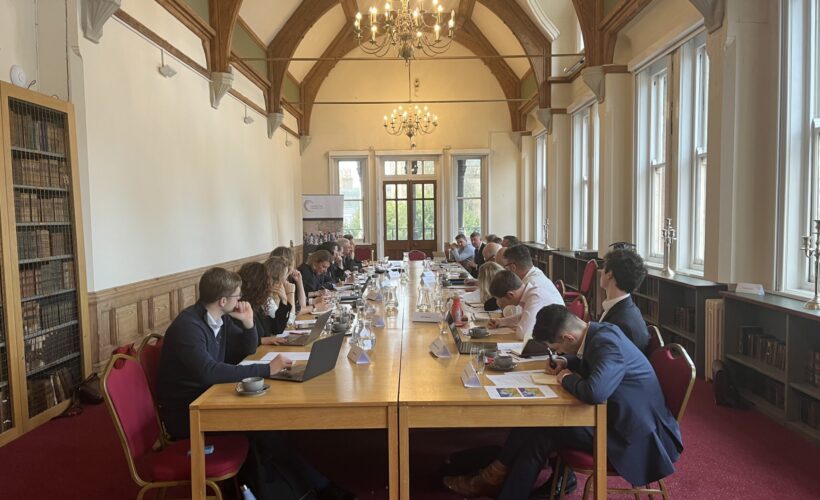Strategic Simulations
Since 2015 the Centre for Geopolitics has run a series of strategic simulation exercises in collaboration with Prof Brendan Simms’ Grand Strategy/Geopolitics masters class. Each simulation centres on an imagined (but realistic) crisis set in the near future, through which a subject of topical security and foreign affairs interest is explored. As events unfold in real time, we bring politicians, academic experts, officials, diplomats, and military leaders together with our MPhil students in a true-to-life simulation of the UK’s National Cabinet Office Briefing Room (COBR) in operation.
The aim is to allow all involved to deepen their knowledge of a contemporary geopolitical issue, and to develop strategic thinking skills and test potential future developments and options, in keeping with the Centre’s mission to offer new historically grounded approaches to enduring geopolitical problems. For the students, this is an opportunity to interact with and learn from those who have dealt (or are still dealing) with these challenges in government and affords the opportunity to think about the historic themes that run through their MPhil module in a contemporary context. For the politicians, experts, and officials who participate, we hope to broaden existing knowledge across disciplines and professions and to benefit from constructive questioning of each other and from the students. For all, there is the opportunity to reflect on the nature of government responses to current foreign, defence, and national security challenges. The simulation provides a safe, experimental space for current policymakers to probe and challenge orthodoxies and possible solutions.
The simulation is conducted under the Chatham House rule to allow for the full and frank discussion of the topic that would occur between ministers and officials dealing with a crisis. However, we report our most significant findings in a public panel event at the end of the day where we also explore the underlying themes and challenges that the exercise has illuminated.
Our Highlights
It was the Russian invasion of 2014 that spurred our first simulation. With Nobel Peace Prize winner Lord David Trimble in the Prime Minister’s chair we looked at the new thresholds for NATO’s military and political responses in the face of Putin’s aggression and the blurring of conventional ideas of state-on-state conflict by his ‘little green men’. We have periodically returned to the NATO/Russia border. In 2021, just months before Russia’s invasion of Ukraine we demonstrated just how dependent Europe had become on oil and gas supplies from Russia, and accurately predicted the global price shock that would occur if they were cut. The following year we highlighted the vulnerability of critical undersea infrastructure on which western democracies now depend, to Russian attack. But we have ranged widely in theme and geography; in 2016 we were quick to highlight the complexity that the Northern Ireland border would bring to the UK’s looming Brexit negotiations and in 2023 we asked searching questions about the true depth of the UK’s ‘Pacific Tilt’. Migration, food security, cultural identity questions, defence capability, international security arrangements and the impact of social media on political decision making have all featured during the series.
For a full list of our simulations please see the links on the right.
Former participants:
Our simulations are chaired by a former UK Secretary of State playing the role of UK Prime Minister, assisted by a range of senior serving and former officials.
- Lord David Trimble, Former First Minister of Northern Ireland, Nobel Peace Prize winner
- Rt Hon Amber Rudd, Former Secretary of State, Home Office
- Rt Hon Andrew Mitchell MP, Former Secretary of State for International Development, Current Minister of State FCDO
- Rt Hon Charles Clarke, Former Secretary of State, Home Office
- Rt Hon Sir Malcolm Rifkind, Former Secretary of State for Foreign Affairs
- Rt Hon Douglas Alexander, Former Secretary of State for International Development.
- Rt Hon Sir David Lidington, Former Lord Chancellor and Minister of State FCO
- Lord Simon MacDonald, Former Head, UK Diplomatic Service
- Sir Laurie Bristow, Former UK Ambassador to Russia and Afghanistan
- Dame Veronica Sutherland, Former UK Ambassador to Republic of Ireland
- Sir Richard Dearlove, Former Chief, UK Secret Intelligence Service (MI6)
- Lt Gen (retired) Doug Chalmers, Former UK Deputy Chief of Defence Staff
- Tim Sebastian, Presenter, BBC HARDtalk
Institutional participants:
- Foreign, Commonwealth and Development Office
- Cabinet Office
- Ministry of Defence
- Home Office
- Royal Navy
- British Army
- Royal Air Force
- NATO Joint Expeditionary Force (JEF)
- Scott Polar Research Institute
- Office of the Nuclear Regulator
- British Red Cross




